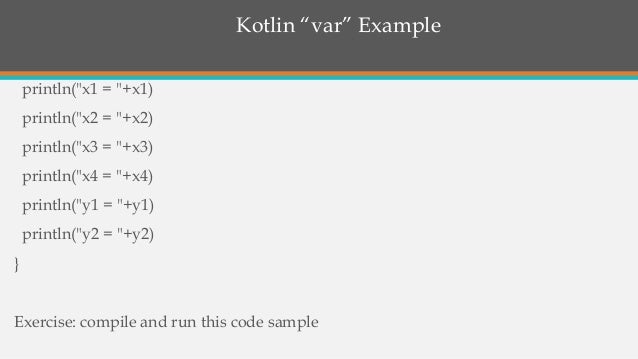

I am currently defending the third place on the top users list of the Kotlin tag on StackOverflow, and I wanted to make use of the bragging rights this gives me while I can. When you’re done with this one, read the second and third parts as well! Val anyMutableList2 = mutableListOf("bezkoder.This is the written version of a talk I gave recently, and since it was quite long, this is the first of three articles about it. Val anyMutableList1 = mutableListOf ("", 2019, "kotlin") Val intMutableList = mutableListOf (1, 2, 3) Val anyList3 = listOfNotNull("", 2019, null)

Val stringList = listOf ("", "programming", "tutorial")
create new List, MutableList from another List, MutableList with the same elements using toList(), toMutableList() functions. create new List, MutableList using Initializer functions. initialize MutableList using mutableListOf(). initialize List using listOf() and listOfNotNull() functions. Kotlin Initialize List, MutableList with values Val anyMutableList: MutableList = mutableListOf () Val stringMutableList: MutableList = mutableListOf () Val intMutableList: MutableList = mutableListOf () For different data types, or for object types, we’re gonna use Any. We can specify the type of items in the List ( Int, String…). 
We create a new empty List, MutableList using mutableListOf() method.

List & MutableList allows duplicates and null values. List & MutableList are ordered collections in which the insertion order of the items is maintained. MutableList inherites List and supports read/write access, you can add, update or remove items. List is read-only (immutable), you cannot add or update items in the original list. These are some important points you should know before working with Kotlin MutableList: Important points about Kotlin List & MutableList Kotlin Initialize List, MutableList with values. Important points about Kotlin List & MutableList.








 0 kommentar(er)
0 kommentar(er)
